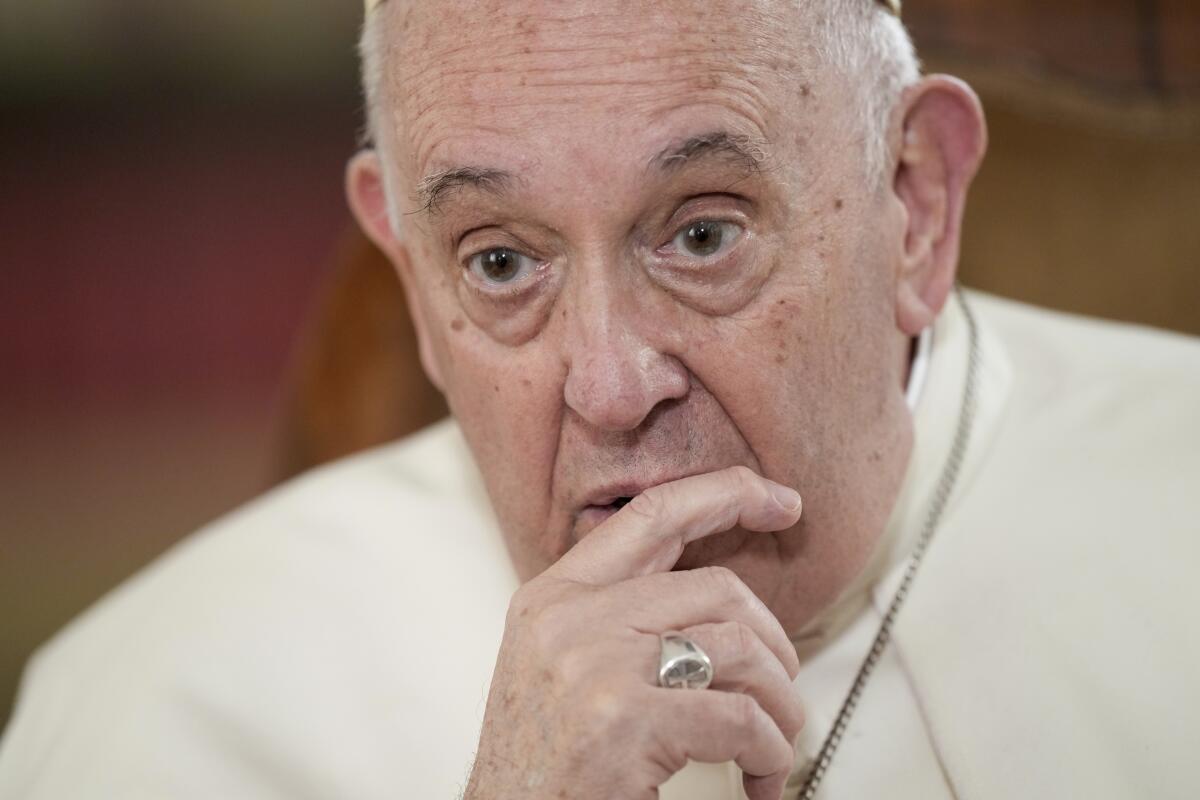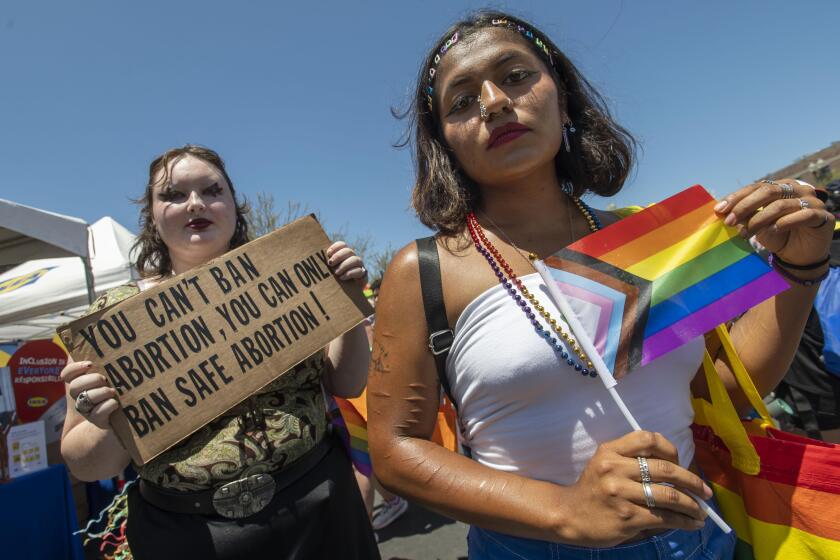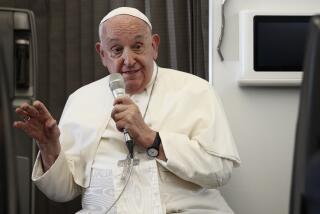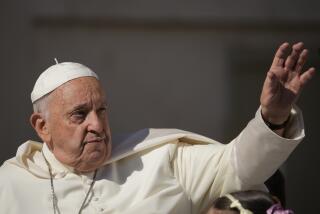Pope Francis says homosexuality is not a crime, but a sin

- Share via
VATICAN CITY — Pope Francis criticized laws that criminalize homosexuality as “unjust,” saying God loves all his children just as they are and called on Roman Catholic bishops who support the laws to welcome LGBTQ people into the church.
“Being homosexual isn’t a crime,” Francis said during an interview Tuesday with the Associated Press.
Francis acknowledged that Catholic bishops in some parts of the world support laws that criminalize homosexuality or discriminate against LGBTQ people, and he himself referred to the issue in terms of “sin.” But he attributed such attitudes to cultural backgrounds, and said bishops in particular need to undergo a process of change to recognize the dignity of everyone.
“These bishops have to have a process of conversion,” he said, adding that they should apply “tenderness, please, as God has for each one of us.”
Francis’ comments, which were hailed by gay rights advocates as a milestone, are the first uttered by a pope about such laws. But they are also consistent with his overall approach to LGBTQ people and belief that the Catholic Church should welcome everyone and not discriminate.
Some 67 countries or jurisdictions worldwide criminalize consensual same-sex sexual activity, 11 of which can or do impose the death penalty, according to the Human Dignity Trust, which works to end such laws. Experts say that even where the laws are not enforced, they contribute to harassment, stigmatization and violence against LGBTQ people.
In the U.S., more than a dozen states still have anti-sodomy laws on the books, despite a 2003 Supreme Court ruling declaring them unconstitutional. Gay rights advocates say the antiquated laws are used to justify harassment, and point to new legislation, such as the “Don’t say gay” law in Florida, which forbids instruction on sexual orientation and gender identity in kindergarten through third grade, as evidence of continued efforts to marginalize LGBTQ people.
Experts say children are at risk from a surge in anti-LGBTQ legislation.
The United Nations has repeatedly called for an end to laws criminalizing homosexuality outright, saying they violate rights to privacy and freedom from discrimination and are a breach of countries’ obligations under international law to protect the human rights of all people, regardless of their sexual orientation or gender identity.
Declaring such laws “unjust,” Francis said the Catholic Church can and should work to put an end to them. “It must do this. It must do this,” he said.
Francis quoted the Catechism of the Catholic Church in saying gay people must be welcomed and respected, and should not be marginalized or discriminated against.
“We are all children of God, and God loves us as we are and for the strength that each of us fights for our dignity,” Francis said, speaking to the AP in the Vatican hotel where he lives.
Francis’ remarks come ahead of a trip to Africa, where such laws are common, as they are in the Middle East. Many date from British colonial times or are inspired by Islamic law. Some Catholic bishops have strongly upheld them as consistent with Vatican teaching, while others have called for them to be overturned as a violation of basic human dignity.
In 2019, Francis had been expected to issue a statement opposing criminalization of homosexuality during a meeting with human rights groups that conducted research into the effects of such laws and so-called “conversion therapies.”
In the end, after word of the audience leaked, the pope didn’t meet with the groups. Instead, the Vatican‘s No. 2 official did and reaffirmed “the dignity of every human person and against every form of violence.”
There was no indication that Francis spoke out about such laws now because his more conservative predecessor, Pope Benedict XVI, recently died. The issue had never been raised in an interview, but Francis willingly responded, citing even the statistics about the number of countries where homosexuality is criminalized.
On Tuesday, Francis said there needed to be a distinction between a crime and a sin with regard to homosexuality. Church teaching holds that homosexual acts are sinful, or “intrinsically disordered,” but that gay people must be treated with dignity and respect.
Bantering with himself, Francis articulated the position: “It’s not a crime. Yes, but it’s a sin. Fine, but first let’s distinguish between a sin and a crime.”
“It’s also a sin to lack charity with one another,” he added.
Francis has not changed the church’s teaching, which has long riled gay Catholics. But he has made reaching out to LGBTQ people a hallmark of his papacy.
Many fear LGBTQ rights will be the Supreme Court’s next target
The pope’s comments didn’t specifically address transgender or nonbinary people, just homosexuality, but advocates of greater LGBTQ inclusion in the Catholic Church hailed the pope’s comments as a momentous advance.
“His historic statement should send a message to world leaders and millions of Catholics around the world: LGBTQ people deserve to live in a world without violence and condemnation, and more kindness and understanding,” said Sarah Kate Ellis, president and chief executive of the U.S.-based advocacy group GLAAD.
New Ways Ministry, a Catholic LGBTQ advocacy group, said the church hierarchy’s silence on such laws until now had had devastating effects, perpetuating such policies and fueling violent rhetoric against LGBTQ people.
“The pope is reminding the church that the way people treat one another in the social world is of much greater moral importance than what people may possibly do in the privacy of a bedroom,” the group’s executive director, Francis DeBernardo, said in a statement.
One of the cardinals recently appointed by the pope — Robert McElroy, the bishop of San Diego — is among those Catholics who would like the church to go further, and fully welcome LGBTQ people into the church even if they are sexually active.
“It is a demonic mystery of the human soul why so many men and women have a profound and visceral animus toward members of the L.G.B.T. communities,” McElroy wrote Tuesday in the Jesuit magazine America. “The church’s primary witness in the face of this bigotry must be one of embrace rather than distance or condemnation.”
Starting with his famous 2013 declaration, “Who am I to judge?” — when he was asked about a purportedly gay priest — Francis has gone on to minister repeatedly and publicly to the gay and transgender communities. As archbishop of Buenos Aires, he favored granting legal protections to same-sex couples as an alternative to endorsing gay marriage, which Catholic doctrine forbids.
Despite such outreach, Francis was criticized by the Catholic gay community for a 2021 decree from the Vatican’s doctrine office that said the church cannot bless same-sex unions.
In 2008, the Vatican declined to sign on to a U.N. declaration that called for the decriminalization of homosexuality, complaining the text went beyond the original scope. In a statement at the time, the Vatican urged countries to avoid “unjust discrimination” against gay people and end penalties against them.
More to Read
Sign up for Essential California
The most important California stories and recommendations in your inbox every morning.
You may occasionally receive promotional content from the Los Angeles Times.












